#Laylatul Qadr - the Night of Power
Explore tagged Tumblr posts
Text
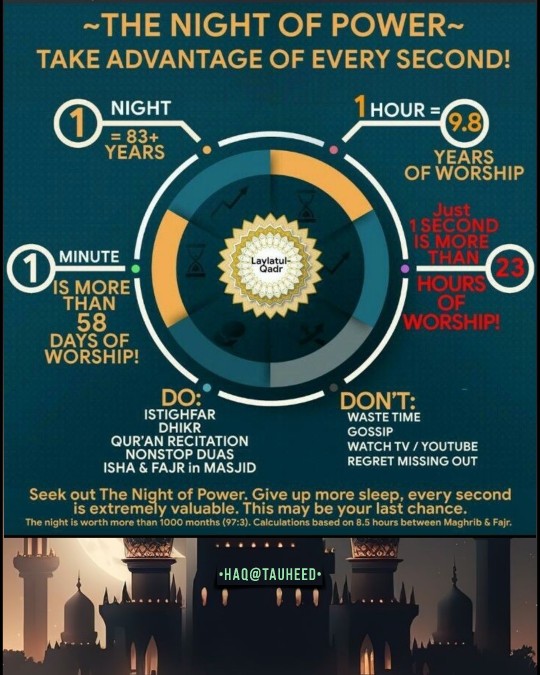


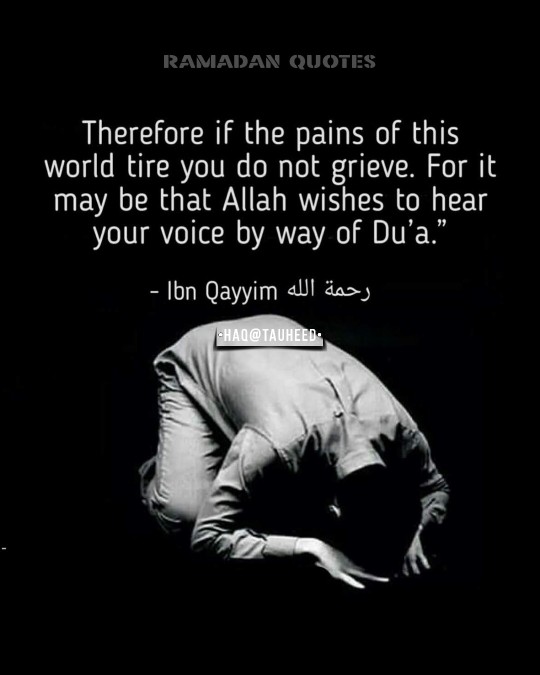


#allah's love#limit#charity#sadaqa#ppor#rude#hate speech#Laylatul Qadr#The Night of Power#23rd Day Of Ramadan#search#dua#repentance#resurrection day#voice#lower your voice#Allah is all hearing and Seeing#islam#allah#prophet muhammed pbuh#people#guidance#the quran#islamicquotes#duaa#peace
2 notes
·
View notes
Photo

(via Laylatul Qadr) When is Laylatul Qadr?
3 notes
·
View notes
Text
Unearth the Night of Power: 5 Authentic Signs of Laylatul Qadr Revealed!
Can we see Laylatul Qadr? Laylatul Qadr could also be seen with the attention, for the one whom Allah helps to see it. That’s by seeing its indicators. The Sahabah (could Allah be happy with them) used to acknowledge it by its indicators. However not seeing them doesn’t imply that one won’t achieve its reward, if one spends that night time in prayer out of religion and the hope of reward.…

View On WordPress
#5 Authentic Signs of Laylatul-Qadr#Laylat-ul-Qadr#Laylatul Qadr#laylatul qadr benefits#laylatul qadr story#Night of Power#Prophet Muhammad#Ramadan#ramadan 2024#when is the night of power#why is laylat al-qadr important
0 notes
Text
Laylatul Qadr & Last 10 Days of Ramadan
‘Aisha said, “I said, ‘Messenger of Allah, if I know what night the Night of Power is, what do you think I should say during it?’ He said, ‘Say: “O Allah, You are Pardoning and you love pardon, so pardon me.”‘” [Tirmidhi]
DUA
اللْهُمَّ إِنَّكَ عَفُوٌّ تُحِبُّ الْعَفْوَ فَاعْفُعَنِّي
Allahumma innaka `afuwwun tuhibbul `afwa fa`fu `annee
“O Allah, You are Pardoning and you love pardon, so pardon me.”
111 notes
·
View notes
Text
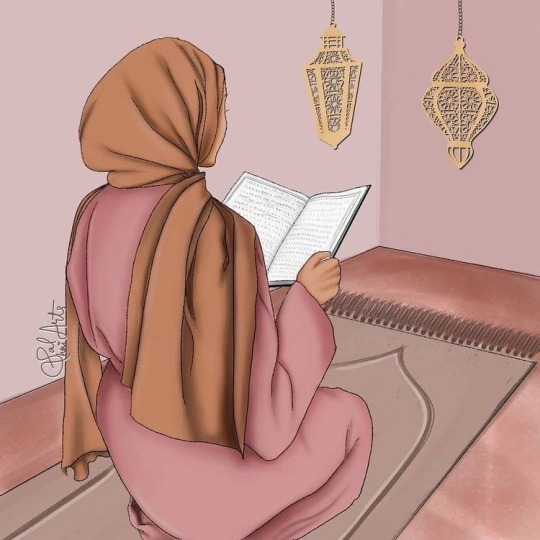

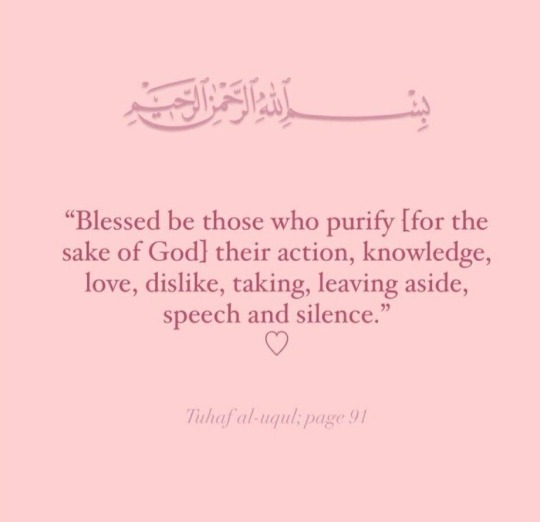
ramadan series: why is ramadan important?
it is the holiest month in Islam the Holy Qur'an, which is forever a blessing for all of mankind, was revealed during this month. in this month, not only are we reminded of the less fortunate during Ramadan but we learn patience, purify ourselves and devote ourselves to Allah to get nearer to Him.
it is one of the five pillars the pillars represent the acts of worship which Allah has commanded us to follow to practise our faith. this unites us together, especially during Ramadan.
the doors of heaven are opened subhanallah, the gates to our goal and destination are open during this month which shows that Allah is allowing us to be extremely near to Him with our good deeds/actions. this is also symbolic of how blessed Ramadan is.
the doors of hell are closed this means that it is easier for us to not be tempted by shaytan and control our behaviour. this allows us to have a full month to develop and strengthen good habits to continue after Ramadan ends. this also allows us to recognise weaknesses within ourselves that are there without shaytaan's whispers, helping us to work on ourselves better in a pure month.
rewards are multiplied this is a chance for us to repent and do good deeds in order to be forgiven and have our blessings outweigh our sins.
laylatul-qadr is in ramadan which is better than 1000 months this is the night of power which we seek in the last 10 days where our sincere and genuine du'as and prayers are answered and past sins forgiven, subhanallah.
may Allah سُبْحَٰنَهُۥ وَتَعَٰلَىٰ make it easy for us and help us change for the better during Ramadan and may He forgive our sins, Allahumma Ameen
#ramadan series#islam#ramadan#islamic#dua#muslim#muslims#muslimah#deen#religious#islamic dua#holy quran#hadith#quran#allah#allah swt#qur'an#islamic reminders#religion#ramadan mubarak#allahﷻ#tasbeeh#zikr#azkar#islamdaily#prayer#fajr#prayers#maghrib
595 notes
·
View notes
Text
Laylatul Qadr (Night of Power) 🤍✨
One meaning of the word 'Qadr' is 'greatness, honour or dignity'. The night of Qadr has been given this name because it is a night of greatness, honour, majesty and dignity.
Abū Bakr Warrāq رحمه الله has stated that this night is so called because a person becomes a man of honour and dignity on account of repentance, seeking pardon and righteous acts during this night whilst prior to this he might have lacked honour and dignity on account of an unrighteous life he might have led.
The greatest virtue of the night is that the acts of worship performed on this single night is better than worship in 1000 months (83 years, 4 months).
The Messenger of Allāh ﷺ said, "He who spends the Night of Qadr in the worship of Allāh, all his past sins will be forgiven.
In another narration Allāh's Messenger ﷺ said, "All the angels resident at the Lote Tree of the Uttermost Boundry descend in the leadership of ��aḍrat Jibr'īl عليهم السلام and greet every believer, man or woman, except the one who takes wine or eats pork."
In a different narration by Ḥaḍrat Anas رضي الله عنه the Messenger of Allāh ﷺ said, "When the night of Qadr occurs, Ḥaḍrat Jibr'īl descends on the earth with a huge gathering of angels and all of them pray for every servant of Allāh, man or woman, busy in ṣalāh or dhikr, to be blessed by Allāh تعالى.
The Messenger ﷺ was asked what supplication should be made if one finds the night. The Messenger ﷺ replied,
اَللّٰهُمَّ إِنَّكَ عَفُوٌّ تُحِبُّ الْعَفْوَ فَاعْفُ عَنِّيْ
O Allāh, Indeed You are the Oft-Pardoning, You love to pardon, so pardon me.
The Messenger of Allāh ﷺ instructed to search for it (the night) in the odd nights of the last ten days.
[Ma'āriful Qur'ān, Volume 8]
Ibn Al-Qayyim says: "If Laylatul Qadr was a single night out of the year, I'd endeavour the whole year until I found it! What then are mere ten nights."
[Badā'i' al-Fawā'id]
"Scholars mention the wisdom behind concealing the Night of Al-Qadr is so that one may become more diligent in striving for it, and work harder in order to attain what they seek. It wouldn't have been the case if the Night was singled out..."
[Fatḥ al-Bārī, 4/266]
38 notes
·
View notes
Text
The Qur'aan - Basic Facts Part 1
1. The meaning of the word 'Qur'aan' is To read or That which is read 2. The first verses of the Qur'aan were revealed in the cave Hira on Mount Noor (Makkaah) 3. The first verses of the Qur'aan were revealed in Laylatul-Qadr (The Night of The Power). In the month of Ramadhaan 4. Allah revealed the Qur'aan to the Prophet Muhammad through the Angel Jibraeel (Gabriel) 5. The Qur'aan was revealed to the Prophet Muhammad over a period of 23 Years.Some portions were revealed in the city of Makkaah Al-Mukarramah and other portions in the city of Madinah Al-Munawwarah. . . . #bismillah#islamicreminder#loveislam#islampost#islamicposts#islamicreminders#islamicquotes#islamicquote#deen#islamicpost#islam#islamformankind #islam#alhamdulillah#quran#islamicquotes#اسلام#deen#quranverses#islamicreminder#Hijab#hijabi#quran#mashallah#islamformankind#holyquran#religion#islam#muslim#islamic#jannah#allah#قرآن#taqwa#الله#محمد#مكة
21 notes
·
View notes
Text

Allah’s name Al-Witr— The One and Unique—is not mentioned in the Quran, but occurs in a narration of the Prophet salallahu ‘alayhi wa sallam. Al-Witr is the One, the Unique and Only. He is unique in His essence in all His attributes and there is nothing equal to Him in any way!
The One, Odd-numbered, and Unique
Witr comes from the root waw-taa-raa, which points to three meanings. The first meaning is to be odd (numbered), one and single. and the second is to be in succession. A third meaning is to deprive.
This root appears three times in the Quran in three derived forms. Examples of these forms are yatirakum (“will deprive you”), tatraa (“in succession”) and wal-watri (“and the odd”).
Linguistically witr means that which is odd-numbered, unever, not uniform or equable. Allah’s name Al-Witr is related in meaning to His beautiful names Al-Ahad and Al-Waahid. All indicate that Allah ‘azza wa jall is one, only and unique in His essence, all His powers, knowledge and abilities.
The Prophet salallahu ‘alayhi wa sallam said: Allah is witr (single, odd) and loves what is witr. So perform witr prayer. O followers of Quran, observe witr (prayer). [At-Tirmidhee, Abu Dawud]
Examples of Witr in Worship
In Islam the ways we worship are indicated to the finest details in the Quran and the sunnah of the Prophet Muhammad salallahu ‘alayhi wa sallam. An example is the number of times we are ought to carry out certain acts of worship, of which some are in witr (odd numbers) only.
Examples are the tawaaf (circulation) around the ka’bah, which is prescribed to be done seven times as well as the times Muslims go between Safaa and Marwaa as Hajj and Umrah ritual.
According to some ahadeeth the Night of Decree (laylatul qadr) is to be found in the last ten nights of Ramadhan, in the odd-numbered nights.
Another example is the amount of days which is sunnah to fast as one of the ways of the Prophet to fast was on ayaam ul beed – the white days – which are three days in the middle of each month.
The most known example regarding witr is the Witr prayer, which is a strongly recommended prayer of an odd-numbered rakaat to be prayed in the time after the ‘Esha prayer and before the Fajr prayer.
How Can You Live By This Name?
1. Keep reminding yourself of the uniqueness of Al-Witr. The fact Allah ‘azza wa jall is one and unique in all He does, knows and gives is something we know, but sometimes forget to live by in our daily lives. Remind yourself each day Allah is the only one who can give you Paradise, so put Him first and not what people think or want of you or even what your ego (nafs) whispers to you!
2. Pray the Witr prayer. The Witr prayer is one of the greatest acts of worship that draw one closer to Allah. The majority of the scholars say is one of the confirmed sunan (a sunnah mu’akkadah) which you as a Muslim should observe regularly and not neglect. Imam Ahmad raheemahullah even said: Whoever neglects Witr is a bad man whose testimony should not be accepted. The Prophet said: Allah has prescribed for you a prayer (by which He may increase your reward), which is Witr; Allah has enjoined it for you during the time between ‘Esha prayer until dawn begins. [At-Tirmidhee, saheeh] Ask Allah Al-Witr to enable you to pray this prayer regularly.
3. Be unique. As true Muslims we all share our belief in Allah Al-Witr alone, but this doesn’t mean we should not strive to be unique in our actions! Do your best to perform as many good deeds as you can, be creative and set up your own projects on the path of Islam and for the pleasure of Al-Witr and by the will of Allah, leave an unique legacy in this world which will count for you in the Herefter inshaa’Allah.
4. Know the meaning of tawheed and live by it. Studying the meaning of tawheedullaah (the Oneness of Allah), its types and how to live by them is the most important branch of Islamic knowledge. Part of this knowledge are knowing the names and attributes of Allah ‘azza wa jall. At least spend one day a week of which you read from a trustworthy book about tawheed and its types and make sure to convey this knowledge to your children and family inshaa’Allah!
O Allah, Al-Witr, we know that you are one, single and unique. Help us to remind ourselves of Your oneness and turn to You only for all our needs and make us of those who consistently pray the Witr prayer. Increase our knowledge of tawheed and its types, aid us to live by them, and enable us to leave a unique legacy of ongoing good deeds for those who come after us until the day of judgement, ameen!
#allah#god#islam#muslim#quran#revert#convert#convert islam#revert islam#reverthelp#revert help team#help#islamhelp#converthelp#how to convert to islam#welcome to islam
6 notes
·
View notes
Text
Duaa for Laylatul Qadr🌙
‘A’isha said, “I said, ‘Messenger of Allah, if I know what night the Night of Power is, what do you think I should say during it?’ He said, ‘Say: “O Allah, You are the Most forgiving and you love to forgive, so forgive me.” [Tirmidhi]
اللْهُمَّ إِنَّكَ عَفُوٌّ تُحِبُّ الْعَفْوَ فَاعْفُعَنِّي
Allahumma innaka `afuwwun tuhibbul `afwa fa`fu `annee.❤️🩹
31 notes
·
View notes
Text
Jumu'ah Sohbet: 5 April 2024
Alhamdulillah for another productive Ramadan week in the lead up to Laylatul Qadr (The Night of Power / Decree), where we continued to contemplate on and practice taqwa (self-vigilance).
#1. Anne spoke about Laylatul Qadr (The Night of Power). It involves the Angels where Prophet Muhammad PBUH saw them in person on Laylatul Mi'raj (His blessed night journey and his ascension into Heaven). We may even be blessed to see them as our helpers because they witnessed our creation, and they help us to maintain Allah's order.
Thereafter, Anne said that she hoped that our taqwa (self-vigilance) practices were coming into effect when we were feeling disconnected, angry, or forgetful of turning to Allah. We ought to spend the time in Ramadan with Allah regardless of what is happening around us! The reasons we get angry could be because of injustice or feelings of control, entitlement, or fear. Surely, these are all reasons for us to turn to Allah. Ramadan is the ideal opportunity for detoxing our bad habits.
Ramadan gives us an extra incentive to practice taqwa, which is the actions that Allah is happy with. When we are contemplating on taqwa and we're watching our actions, we keep Allah's pleasure in mind! Many of us reported that this is the most spiritually connected that we've felt, with gratitude for Anne's spiritual leadership acumen.

#2. Fellow murids (followers), Sister Hayat and Wakil Rosieçim reflected that when they were running out of sabr (patience), they practiced taqwa, which moved them into love. One actually feels taqwa in one's body, muscles, and emotions. You have to be involved physically, mentally, emotionally, and spiritually with love. Similarly, as reflected by Sister Fatima, there is a place where Love is loving itself! It's Allah's love where humans are able to bring it back and reflect Him, insha'Allah.

Khalifa Rubina reflected that because we are studying taqwa so deeply, there were definite changes within our bodies. We perceive the change in our actions, where we experience peace and calmness. Anne astutely picked up another point, where we are experiencing Allah within ourselves. Our brains help us to understand, but our whole beings bring us to live with Allah. That is why it is said that Sufism should be learned by living our individual experiences of Allah.
#3. Our brother Daud referred to observing taqwa through difficulty. Anne postulated that there were two ways to deal with the difficulty. One way could be to surrender to Allah by accepting and witnessing what is happening in the subsequent moments. We pray for it while turning to Allah and saying, "What would You like to show me through this?" This is the moment-by-moment unfolding of my post-accident life which I have entiled my "Accidental Epiphany"! The other futile way is blocking and ignoring it.
Anne reminded us about the legacy of Hazrat Musa AS and Hazrat Khidr AS. When things go wrong, we should be asking the "what" questions rather than the "why" questions. What does Allah want to show me here? Am I seeing what is really happening, or am I seeing the veil? Who will open the veil? Allah will, insha'Allah. It won't happen while we're blocked and turned away. It is through witnessing, acknowledging, and feeling through our human faculties. We are not robots that are locked and closed up. Instead, we open ourselves to Allah.
In conclusion, I am left with humbled gratitude for our Tariqa as a deep spiritual school of like-minded hearts, from myriad walks of life, that have mystically been brought together ...
Shukran Ya Allah (Divine gratitude)
4 notes
·
View notes
Text
Abu Hurairah relates that the Messenger of Allaah (صلى الله عليه وسلم) said,
“There are no days more loved to Allaah for you to worship Him therein than the ten days of Dhul Hijjah. Fasting any day during it is equivalent to fasting one year and to offer salatul tahajjud (late-night prayer) during one of its nights is like performing the late night prayer on the night of power. [i.e., Laylatul Qadr].”
[This is related by at-Tirmidhi, Ibn Majah, and al-Bayhaqi]
13 notes
·
View notes
Text
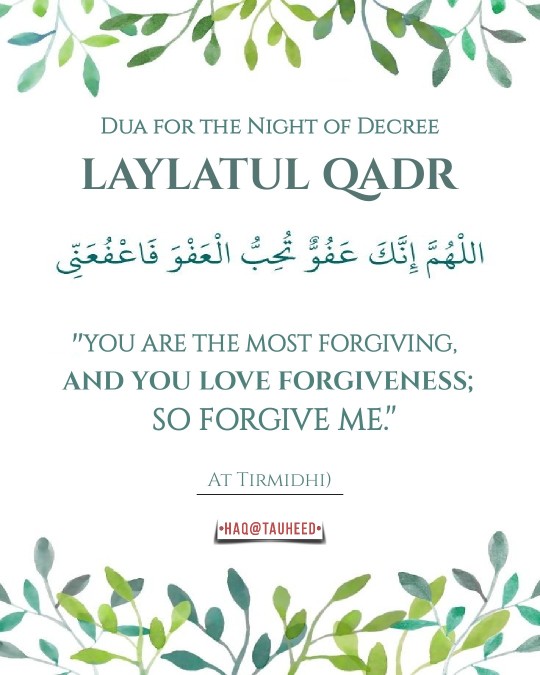
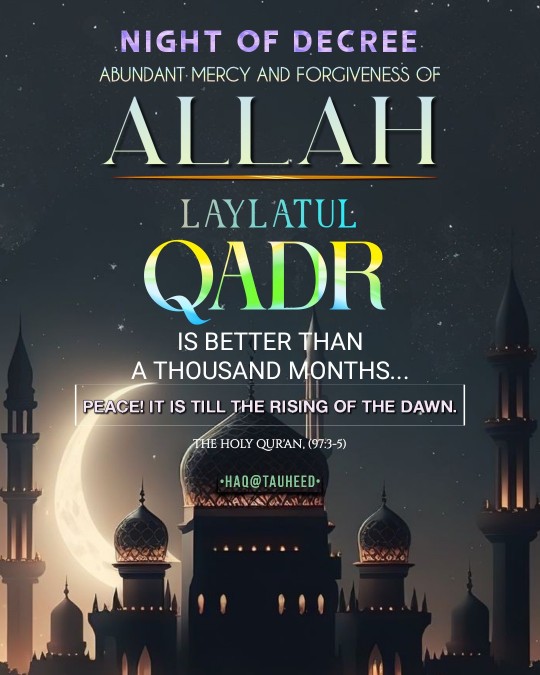

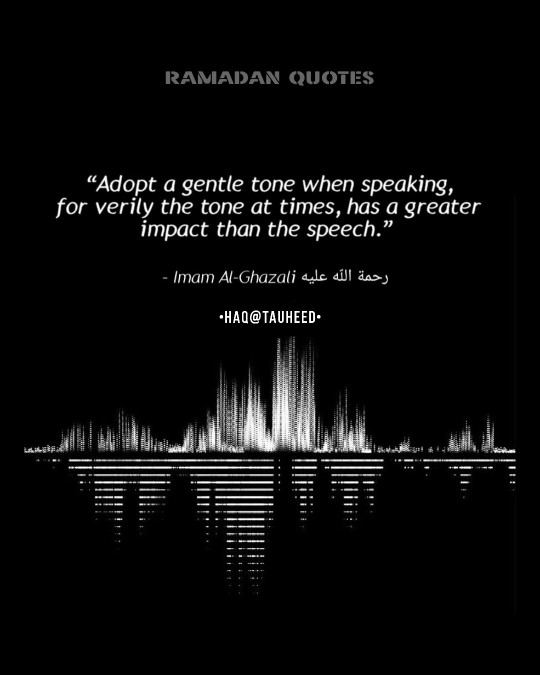

#the night of power#the night of decree#laylatul Qadr#allah#islam#prophet muhammed pbuh#islamicquotes#the quran#guidance#peace#duaa#paradise#people#aameen#alhamdulillah#half shave#forbade#the Prophet (Pbuh)#transient#lower your voice#speech
1 note
·
View note
Text
Making Every Night Count: Ramadan Donation and My Ten Nights
In the Islamic calendar, Ramadan is a sacred month of fasting, prayer, reflection, and community. It is a time when Muslims around the world strive to draw closer to Allah, seek forgiveness, and practice self-discipline. One of the key aspects of Ramadan is the concept of "laylatul qadr" or the Night of Power, which is believed to be better than a thousand months. It is during this night that the Quran was first revealed to the Prophet Muhammad.
As Muslims, we are encouraged to make the most of Ramadan by engaging in acts of worship and charity. One way to maximize our blessings during this auspicious time is by donating to charitable causes. This is where organizations like Penny Appeal Canada play a crucial role.
Penny Appeal Canada is a non-profit organization that is dedicated to providing humanitarian aid and development programs to those in need around the world. Their My Ten Nights campaign is specifically designed for Ramadan, allowing individuals to donate and make a difference during the ten most blessed nights of the month.
The concept of "My Ten Nights" is deeply rooted in Islamic tradition. These are the nights that are believed to hold special significance and are an opportunity for believers to increase their worship and good deeds. By participating in the My Ten Nights campaign, individuals can ensure that their donations are made during these spiritually charged nights, thus multiplying their rewards.
Ramadan Donation is not just about giving money; it's about making a meaningful impact on the lives of others. It's about feeding the hungry, providing clean water to the thirsty, and offering a helping hand to those in need. By donating to organizations like Penny Appeal Canada, we can make a difference in the world and fulfill our duty to help those less fortunate.
One of the key teachings of Islam is the importance of charity. The Prophet Muhammad (peace be upon him) said, "The believer's shade on the Day of Resurrection will be his charity." This highlights the significance of giving in Islam and the rewards that come with it.
The My Ten Nights campaign is an opportunity for Muslims to fulfill this important aspect of their faith. By donating during these special nights, individuals can ensure that their contributions have an even greater impact. Whether it's providing iftar meals to those fasting, sponsoring an orphan, or supporting education programs, every donation counts and can make a difference in someone's life.
In conclusion, Ramadan Donation and the My Ten Nights campaign are an opportunity for Muslims to make a difference in the world and earn blessings during the holiest month of the Islamic calendar. By donating to organizations like Penny Appeal Canada, individuals can ensure that their contributions have a lasting impact on those in need. Let us make the most of this blessed month and strive to make every night count.
2 notes
·
View notes
Text
Powerful Tips for the Last 10 Nights of Ramadan
1. Do not let your ‘performance’ until now affect your last 10 days. The moment of forgiveness could be today or anytime in the coming days! It is not all lost! If you sincerely wish it could have been better - Chin up and get ready to make it your best yet! Start with a positive, sincere intention!
2. Today, take a little time to read the Tafseer of Surah al-Qadr to understand what actually happens this night! You will feel its power & greatness so much more!
3. Do not wait for the 27th Night to give it your “all". The entire last 10 days should be your target. Stay up each night! Would you want to miss Laylatul Qadr even “by chance"?
4. Do not fall into any innovations/celebrations any masjid or culture might try to promote. Follow the Sunnah! The Prophet (sallAllahu ‘alaihi wa sallam) guided us simply: “Whoever stays up and prays on Laylat al-Qadr out of faith and in the hope of reward, his previous sins will be forgiven.”
5. Memorize and keep asking the dua’ taught by Rasulullah (sallAllahu ‘alaihi wa sallam): Allaahumma innaka ‘afuwwun tuhibb al-‘afwa fa’affu ‘anni (O Allaah, You are forgiving and You love forgiveness, so forgive me).
6. Prepare a short dua’ list. Remember this is as awesome as it ever gets for a servant of Allah! The Night of Qadr, of Destiny! Consciously pick each and everything you crucially wish for in this dunya, in your deen, family, and in your aakhirah! Don’t forget to include the brothers and sisters around the world who are suffering and in grief!
7. Take brief naps during the day, if possible. Keep your stomach light and sleep as soon as you have prayed ‘isha. Do not delay! After a brief nap, refresh yourself and get ready for worship.
8. Don’t neglect your family! Rasulullah made it a point to wake up his wives throughout these nights! And yes, your children are not too young to stay up some part of the night - if they can be allowed to play video games or watch TV, they can be inspired to be up atleast for sometime! Prepare them, make them excited, plan some activities for them to do!
9. Look the Part: The way we dress and prepare has a big effect on our psychology. Wear your best, perfume yourself, and feel the energy!
10. Choose a spot, whether in the Masjid or in your home, where you can have peace and solitude. Keep your mushaf, praying mat, and water at hand so that you are not distracted by constantly getting up for this or that.
11. IMP: This is not the night to tweet pics or update FB statuses about how amazing the night is and how you are feeling & worshipping Allah! Let that be a secret between you & your Rabb! So switch off those phones, wifi, laptops and computers. Disconnect with the world, and connect with al-‘Afuww!
12. If you find yourself feeling sleepy, vary your acts of worship. Alternate between qiyaam, heartfelt dua’a, reading the Qur’an. Do not spend the night listening to lectures or recitations. Or do it only for a short while when you feel the sleep coming on!
13. Patience is the Key: The last 10 days might be tiring. You might still have work or school. This is the time to bear all that hardship, and keep firm sabr. Think how Allah has blessed you with this tremendous opportunity that might NEVER come again in your life again. If you knew for sure that this was your last day, if you knew certainly that Jannah was up for grabs, wouldn’t you sprint for it no matter what it takes?
14. This is most important: Keep husn adh-dhann bi Allah (good expectations from Allah). When you ask, remember you are asking the Most Generous King. If you hope for the best, He will give you the best. Don’t hold back. Trust in Him, pour out your heart in front of Him, and let no doubt, no barrier, no evil thoughts keep you away from ar-Rahman, ar-Raheem!
(From: Tawfique Chowdhury)
3 notes
·
View notes
Text
One day in the life of the Prophet (pbuh) in Ramadan?
There is no doubt that the Prophet Muhammad (pbuh) was always at the highest level in worship. Therefore, it is possible to list the deeds of worship he performed in Ramadan in addition to his normal worship as follows:
a. He did not neglect to get up for suhoor. He also recommended suhoor to others.
“Make sure to get up for suhoor because there is blessing in suhoor.” (Bukhari, Sawm, 20)
b. He read the Quran every day. He recited it mutually (in the form of muqabala) with Jibril (Gabriel).
c. During Ramadan, his generosity increased more and more.
We can see those two aspects in the following hadith:
Ibn Abbas narrates:
“The Prophet (pbuh) was the most generous one among people in terms of charity. There was no limit to his generosity, especially when he met Jibril (Gabriel) in Ramadan. His meeting with Jibril took place every day during the month of Ramadan. His generosity in charity was like the blowing wind.” (Bukhari, Sawm, 7)
D. He performed tarawih prayer.
According to what Aisha (ra) narrates, the Prophet (pbuh) led tarawih prayer in congregation in the mosque for three nights. Every night the congregation increased more and more. On the fourth night, there were so many people that the mosque was brimful and many people remained outside the mosque. The congregation waited for the Prophet (pbuh) to come and lead tarawih prayer but he came to lead the morning prayer only. After leading the prayer, he turned toward the congregation and said,
“I knew that you were in the mosque waiting for me, but I feared that tarawih prayer would be rendered fard for you and it would be very difficult for you.”
When Aisha (ra) was asked how many rak’ahs he performed tahajjud (midnight) prayer (tarawih is also a midnight prayer) in Ramadan, she said,
“He did not pray more than eleven rak’ahs together with witr neither in Ramadan nor outside of it.” (see Bukhari, Tarawih, 1)
e. He performed i’tikaf in the last ten days of Ramadan. (see. Bukhari, I’tikaf, 1)
f. He paid special attention to the Night of Power (Laylatul-Qadr). In fact, he generally performed i’tikaf with the intention of worshipping on the Night of Power. As a matter of fact, according to what Abu Said al-Khudri narrates, the Prophet (pbuh) performed i’tikaf in the ten days between the tenth and the twentieth of Ramadan before, and when he came to the 20th day, he said,
“I was shown the Night of Power, but I forgot; look for it in the last ten days of Ramadan.” (Bukhari, I’tikaf, 9)
#islam#quran#islamic#muslim#islamicquotes#pakistan#islamic group#muslim community#muslim countries#istanbul#islamicpost#islamicreminder#hadith#muslim ummah#allah#makkah#muslimah#jannah#alhamdulillah#taraweeh#itikaf#ramadan
2 notes
·
View notes
Text
The Significance of Laylatul Qadr in Islam
Laylatul Qadr, also known as the Night of Decree, holds a unique and profound place in the hearts of Muslims. It is a night mentioned in the Quran as one that is better than a thousand months. This night is a time for reflection, prayer, and seeking forgiveness from Allah, as it is believed that the Quran was revealed on this sacred occasion.
Muslims around the world eagerly await Laylatul Qadr, especially during the last ten nights of Ramadan. It is commonly believed to fall on one of the odd-numbered nights in this period, most notably the 27th night. During Laylatul Qadr, Allah’s mercy is abundant, and Muslims believe that prayers made on this night carry immense value.
The night is a reminder of the importance of the Quran in the lives of Muslims. It is a night to reconnect with the words of Allah, to ask for His guidance, and to reflect on the significance of the Quran in shaping one’s life. For those interested in deepening their understanding of the Quran and learning to read and recite it properly, websites like Shaykhi offer resources that help Muslims learn the Arabic language and enhance their Quranic knowledge.
In addition to seeking spiritual growth, Laylatul Qadr is a time for forgiveness and mercy. Many Muslims spend the night in prayer, asking for Allah’s forgiveness for their past mistakes and for strength in their journey ahead. The peace and serenity of this night make it a powerful time for introspection and renewal of faith.
The importance of Laylatul Qadr is also reflected in the hadiths of the Prophet Muhammad (PBUH), who emphasized its significance. He encouraged Muslims to engage in acts of worship during the last ten nights of Ramadan, especially seeking out the blessed night of Laylatul Qadr.
On this night, the angels descend upon the earth with Allah's commands for the year ahead. It is a time when the mercy of Allah is said to be more abundant than at any other time of the year. For Muslims, it is an opportunity to make supplications, recite the Quran, and ask for blessings for themselves, their families, and the entire Muslim Ummah.
As Ramadan draws to a close, Muslims recognize that Laylatul Qadr is a chance to reset their relationship with Allah and renew their commitment to living a righteous life. It is a night that offers hope, forgiveness, and a deeper connection to the divine.
In conclusion, Laylatul Qadr is not just a time of prayer, but an opportunity for every Muslim to strengthen their faith, reflect on their spiritual journey, and seek forgiveness. Whether through prayer, reflection, or learning, the night brings immense spiritual benefits. To make the most of this blessed time, consider exploring Shaykhi, where you can further your Quranic knowledge and deepen your understanding of Islam.
0 notes